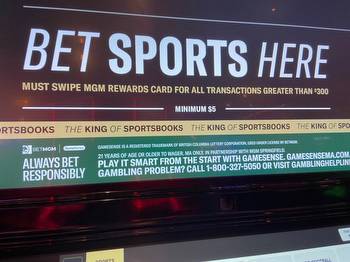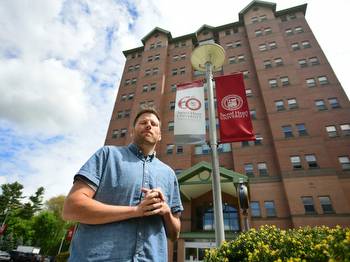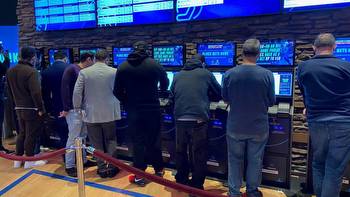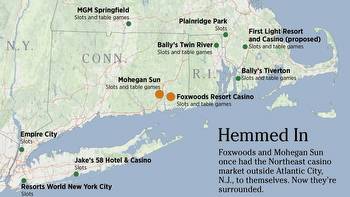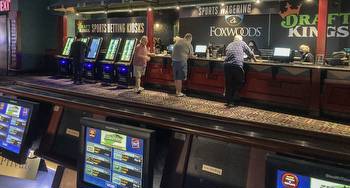CT casinos have responsible gambling programs: 'It's something that we take very, very seriously'

For many, a trip to the casino is a pleasant night out, win or lose.
For some, though, a gambling addiction can make it a lose-lose proposition.
While there is treatment available for those who find themselves addicted to gambling, and help is there for families, as well, it’s much harder to identify people whose wagering is out of control, say those in the field.
“It’s extremely difficult” to identify a gambling addict, said Jeremy Wampler, clinical manager in the Problem Gambling Services unit of the state Department of Mental Health and Addiction Services. “In our field, gambling is considered the hidden addiction because there are no signs. If somebody is betting heavily it doesn’t mean anything.”
State Rep. Michael DiMassa, D-West Haven, arrested last week on a federal criminal complaint charging him with wire fraud, may be one of those for whom the signs were invisible. The FBI affidavit lists a number of withdrawals he allegedly made from a limited liability company that received payments from the West Haven Health Department while saying it was working for the city, along with a listing of alleged cash buy-ins for chips from the Mohegan Sun casino.
For example, on May 7, the day DiMassa reportedly made his first withdrawal from the Compass Investment Group bank account, investigators said in a warrant affidavit that he bought $9,800 in chips at Mohegan Sun and then made further purchases of chips at Mohegan Sun on May 10, 12, 13, 15 and 17. Then, on May 21, DiMassa allegedly bought $4,000 in chips at Mohegan Sun, with further purchases of chips made on May 23, 28 and 29, the affidavit says.
U.S. District Judge Sarah A.L. Merriam said in court that she “understands” DiMassa is “in treatment” for a gambling addiction. DiMassa has not responded to requests for comment.
Both of Connecticut’s casinos have responsible gambling programs.
“It’s something that we take very, very seriously,” said Ray Pineault, CEO of Mohegan Gaming & Entertainment, which runs the Mohegan Sun casino in Montville.
“We offer a training video on identifying problem gamblers and … how to treat the person with respect because you have to do it individually,” he said. “We have to be careful about not accusing someone of something they may not have.”
Each employee has a “secondary badge” with the council’s help line number that can be shown to gamblers, Pineault said.
Signs in the casino offer help to visitors. He said Mohegan Sun has had talks with GameSense, but “they’re just very protective of their brand.” GameSense, first launched in British Columbia, is a program in which casino floor walkers help identify problem gamblers and discreetly approach them.
GameSense was unable to respond to a request for comment.
Anika Howard, a vice president at Foxwoods Resort Casino, issued a statement, saying, “Fostering a safe and responsible gaming experience for our player community is a top priority for the Mashantucket Pequot Tribal Nation and Foxwoods.
“In addition to working with the Connecticut Council on Problem Gambling, alongside DraftKings we’re committing millions of dollars to promote safer play initiatives and are leveraging technology, employee training and evidence-based research to enhance these efforts,” Howard said.
Wampler’s unit oversees five regional Bettor Choice treatment programs offered throughout the state, partnering with the Department of Consumer Protection, Department of Children and Families and the Department of Criminal Justice.
“They’re mostly funded through the tribes,” he said of the programs, which include those for youth and multicultural groups.
“We know that in terms of problem gambling it’s an area that a lot of people don’t have a lot of base knowledge in,” Wampler said. “Unlike substance use and mental health, a lot of people don’t learn about these things in schools.”
With the state and two Native American tribes each having responsibility for gambling in Connecticut, a coordinated effort isn’t as easy as it is in a state like Massachusetts, which has a statewide gaming commission, expert say.
“It’s apples and oranges,” Goode said. “It’s really not a fair fight to compare a state that has a gaming commission with a state that doesn’t.”
In Connecticut, separate agencies oversee prevention and treatment. The Massachusetts Gaming Commission brought in GameSense. In Connecticut, GameSense is only used by CT Lottery, which has information on its website and a logo: “Use Your GameSense. It just makes sense.”
GameSense has a robust website, which includes myths and facts about a number of casino and card games and slot machines (the bottom line: the house always has the advantage).
When Massachusetts incorporated it, “they were the only state in the U.S. to have GameSense, so they’re kind of a pilot site and it’s been wildly successful,” Wampler said.
But GameSense is limited in Connecticut. “There’s a little green sticker that all of the lottery retailers are supposed to have visible at their outlets, but there’s no help line number affiliated with it,” said Diana Goode, executive director of the Connecticut Council on Problem Gambling.
“GameSense has said you can’t cross-promote and use the help line number,” she said. “You can only use GameSense. There’s no next step. There’s no ‘now what?’”
The council’s help line number, 888-789-7777, has become ubiquitous, on its own sign.
“We’ve decided we wanted one logo, one hotline number that everybody’s going to use,” Goode said.
It’s seen at Mohegan Sun and Foxwoods casinos, Sportech (available at Winners and Bobby V’s Restaurant & Sports Bar), the lottery and the newly available online betting sites: FanDuel, DraftKings and Rush Street Interactive.
But the help line requires gamblers to recognize they have a problem, or for family members to call. There also are self-exclusion programs offered by the casinos and the state, but there is no unified list, Goode said.
For state Sen. Tony Hwang, R-Fairfield, an opponent of online gambling, it’s not enough to expect problem gamblers to seek help. “It shows that we as a state and our governing body do not understand the psychology and the power of gambling addiction,” he said.
“Unless you are put in the situation of being arrested or being financially depleted or doing something to feed that habit, it’s very hard to be found out,” he said. “We need to go out there and warn against the peril of addiction.”
edward.stannard@hearstmediact.com; 203-680-9382










